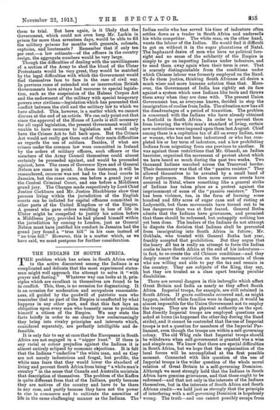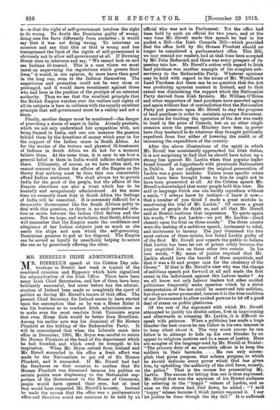THE INDIANS IN SOUTH AFRICA.
THE problem which has arisen in South Africa owing to the active discontent among the Indians is so complicated and delicate that the most experienced states- man might well approach the attempt to solve it "with prayer and fasting." Whatever way one looks at it, prin- ciples which are excellent in themselves are found to be in conflict. This, then, is no occasion for dogmatizing. It is an occasion for moderation and scrupulous reasonable- ness, all guided by the goodwill of patriotic men who remember that no part of the Empire is unaffected by what happens in any other part, and that this fact lays an obligation upon every man who honestly cares to proclaim himself a citizen of the Empire. We may state the facts briefly in order to see clearly how embarrassingly they bring into rivalry principles and interests which, considered separately, are perfectly intelligible and de- fensible.
It is only fair to say at once that the Europeans in South Africa are not engaged in a "nigger hunt." If there is any racial or colour prejudice against the Indians it is almost entirely eclipsed by economic olsjections. It is felt that the Indians " underlive " the white man, and as they are not merely industrious and frugal, but prolific, the white man fears that they would lower the standard of living and prevent South Africa from being "a white man's country" in the sense that Canada and Australia maintain that description of themselves. The problem of the Kaffirs is quite different from that of the Indians, partly because they are natives of the country and have to be there in any case, and partly because they have not the power to rise in commerce and to cultivate the amenities of life in the same challenging manner as the Indians. The Indian coolie who has served his time of indenture often settles down as a trader in South Africa and undersells his white competitor. The white man, on the other hand, wants the labour of the Indian. He would find it difficult to get on without it in the sugar plantations of Natal. The haphazard desire of men who have no political fore- sight and no sense of the solidarity of the Empire is simply to go on importing Indians under indenture, and to send them away again when their term is over. That is scarcely distinguishable from the conditions under which Chinese labour was formerly employed on the Rand. To do them justice, thinking South Africans all desire a much wiser and more humane solution than that. More- over, the Government of India has rightly set its face against a system which uses Indians like tools and throws them away when they are done with. The present Union Government has, as everyone knows, decided to stop the immigration of coolies from India. The situation now has all the disadvantages of a period of transition. The problem is concerned with the Indians who have already obtained a foothold in South Africa. In order to prevent them from lowering the white man's standard of living, certain new restrictions were imposed upon them last August. Chief among these is a capitation tax of £3 on every Indian, man or woman, who has not been indentured or who has com- pleted his or her term of indenture, and a law prohibiting Indians from migrating from one province to another. It was against these restrictions that Mr. Ghandi, an Indian barrister, organized the movement of protest about which we have heard so much during the past two weeks. Two thousand Indians marched across the Transvaal border.
Their demeanour was that of the "passive resister." They allowed themselves to be arrested by a small band of forty policemen. Since then more serious events have occurred in Natal, where something like a general strike of Indians has taken place as a protest against the imprisonment of some of the "passive resisters." There has been violence, too, in the form of burning some hundred and fifty acres of sugar cane and of rioting at Ladysmith, but these movements have turned out to be less dangerous than was at first feared. General Botha admits that the Indians have grievances, and promised that these should be redressed, but unhappily nothing has yet been done. The leaders of the Indians do not attempt to dispute the decision that Indians shall be prevented from immigrating into South Africa in future ; Mr. Gokhale, who treated with General Botha last year, frankly accepted that prohibition. But they argue that the heavy .,e3 tax is really an attempt to force the Indian coolie to leave South Africa at the end of his indentures— in fact, to re-create the old Chinese conditions—and they deeply resent the restriction on the movements of those who are willing and able to pay the tax and remain in the country. They are subjects of the King, they say, but they are treated as a class apart bearing peculiar disabilities.
There are several dangers in this imbroglio which affect Great Britain and India as nearly as they affect South Africa. Imperial troops, for example, are still retained in South Africa. If grave outbreaks occurred and, as might happen, isolated white families were in danger, it would be almost impossible for the Union Government not to employ the troops. They are the physical authority on the spot. But directly Imperial troops are employed questions are asked at home (as happened the other day during the Rand strike), and it cannot be contended that the use of Imperial troops is not a question for members of the Imperial Par- liament, even though the troops are within a self-governing colony. The old Whig rule that Imperial troops should be withdrawn when self-government is granted was a wise and simple one. We know that there are special difficulties in South Africa, but we hope that the organisation of the local forces will be accomplished at the first possible moment. Connected with this question of the use of Imperial troops is the wider question of the whole moral relation of Great Britain to a self-governing Dominion. Although we most strongly hold that the Indians in South Africa have genuine grievances, and that these ought to be redressed—and that not only in the interests of the Indians themselves, but in the interests of South Africa and South African credit—we hold just as strongly that the principle of interfering with a self-governing Dominion is hopelessly wrong. The truth—and one cannot possibly escape from it—is that the right of self-government involves the right to do wrong. No doubt the Dominion guilty of wrong- doing sees the facts differently from ourselves ; it would say that it was rot doing wrong. To intervene on occasion and say that this or that is wrong and has transgressed the limit of the rights of self-government is obviously not to allow self-government at all. If Downing Street were to intervene and say, "We cannot look on and see Indians ill-treated. This is a case where we must insist on supervising the regulations which govern their lives," it would, in our opinion, do more harm than good in the long run, even to the Indians themselves. The supervision and protection could not be very close or prolonged, and it would leave resentment against those who had been in the position of the protégés of an external authority. Thus we see that the excellent principle that the British Empire watches over the welfare and rights of all its subjects is here in collision with the equally excellent principle that self-government must be a reality and not a sham.
Finally, another danger must be mentioned—the danger of provoking a storm of anger in India. Already protests, which we not only understand but sympathize with, are being framed in India, and one can measure the passion behind them by the donations of money which pour in for the support of the Indian cause in South Africa. As for the stories of the torture and physical ill-treatment of Indians in South Africa we do not for a moment believe them. At the same time, it is easy to see how a general belief in them in India would inflame indignation there. Ultimately, of course, as we have often said, we cannot consent to direct the affairs of the Empire on the theory that nothing must be done that can conceivably offend Indian sentiment. We shall always try to govern India for the good of the people, but the affairs of the Empire elsewhere are also a trust which has to be honestly and scrupulously administered. At the same time we earnestly trust that in South Africa the feelings of India will be consulted. It is extremely difficult for a democratic Government like the South African polity to deal with this question, as there is no such personal rela- tion as exists between the Indian Civil Service and the natives. But we hope, and we believe, that South Africans will'remember that the Empire needs the confidence and allegiance of her Indian subjects just as much as she needs the ships and men which the self-governing Dominions promise to put at her disposal. The Empire can be served as loyally by unselfishly helping to secure the one as by generously offering the other.



















































 Previous page
Previous page